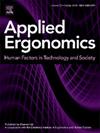技术接受措施在老年驾驶员接受先进驾驶辅助系统方面的应用评估。
IF 3.4
2区 工程技术
Q2 ENGINEERING, INDUSTRIAL
引用次数: 0
摘要
鉴于人口老龄化和持有驾照的老年司机数量不断增加,老年人的道路安全问题令人担忧。高级驾驶辅助系统(ADAS)旨在提高安全性,然而,我们对ADAS的使用与老年人对其的信任和接受程度之间的关系知之甚少。本研究的目的是评估老年驾驶员对ADAS的接受度和信任度。一项针对1008名澳大利亚老年司机(M = 72.1, SD = 6.94)的调查发现,绝大多数人对ADAS持积极态度,但对该系统的信任度较低,司机对隐私、安全和系统故障感到担忧。对部分自动化接受度量表进行了验证,产生了一个四因素模型,测量对ADAS的态度、对技术的态度、信任和对风险的看法。多元回归显示,四个因素中有三个预测了ADAS的使用,为量表的效度和信度提供了初步证据。本文章由计算机程序翻译,如有差异,请以英文原文为准。
Assessment of the application of technology acceptance measures to older drivers’ acceptance of advanced driver-assistance systems
Older adults’ road safety is a concern given the ageing population and increasing numbers of licensed older drivers. Advanced Driver-Assistance Systems (ADAS) are designed to improve safety, however little is known about the relationship between ADAS use and its trust and acceptance in older adults. The purpose of this study was to assesses an instrument of older driver acceptance of and trust in ADAS.
A survey distributed to 1008 older Australian drivers (M = 72.1, SD = 6.94) found there was an overwhelmingly positive attitude towards ADAS, however trust in the systems were low and drivers had concerns with privacy, safety and failure of the systems. The Partial Automation Acceptance Scale was validated, producing a four-factor model measuring attitudes towards ADAS, attitudes towards technology, trust and perceptions on risk. Multiple regression showed three of the four factors predict use of ADAS, providing preliminary evidence of the validity and reliability of the scale.
求助全文
通过发布文献求助,成功后即可免费获取论文全文。
去求助
来源期刊

Applied Ergonomics
工程技术-工程:工业
CiteScore
7.50
自引率
9.40%
发文量
248
审稿时长
53 days
期刊介绍:
Applied Ergonomics is aimed at ergonomists and all those interested in applying ergonomics/human factors in the design, planning and management of technical and social systems at work or leisure. Readership is truly international with subscribers in over 50 countries. Professionals for whom Applied Ergonomics is of interest include: ergonomists, designers, industrial engineers, health and safety specialists, systems engineers, design engineers, organizational psychologists, occupational health specialists and human-computer interaction specialists.
 求助内容:
求助内容: 应助结果提醒方式:
应助结果提醒方式:


